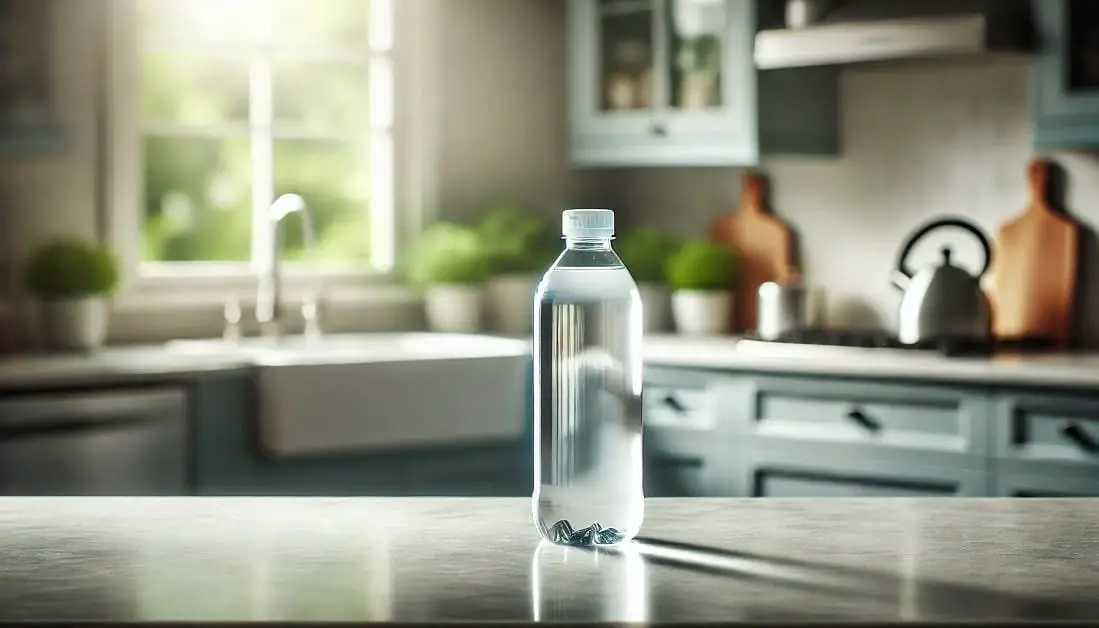Jump to Section
1. Introduction
Have you ever looked at a bottle of distilled water sitting in your pantry for months and wondered, “Does distilled water expire?” You’re not alone. Many people are unsure whether this pure form of water actually has an expiration date or if it’s still safe to use after being stored for long periods.
Distilled water is a type of purified water that has undergone a process of distillation to remove impurities like minerals, salts, and contaminants. It’s commonly used in households for a variety of purposes—whether it’s filling the steam iron, watering plants, or even in medical devices. Despite its purity, the question of its shelf life often comes up. Does it have a shelf life like bottled water or can it last indefinitely?
In this article, we’re going to explore whether distilled water really does expire. We’ll cover the factors that impact its quality, how to store it properly, and whether you need to worry about that bottle of water on your shelf. By the end, you’ll have a clear understanding of how long distilled water lasts and how to keep it fresh for longer.
2. What Is Distilled Water?
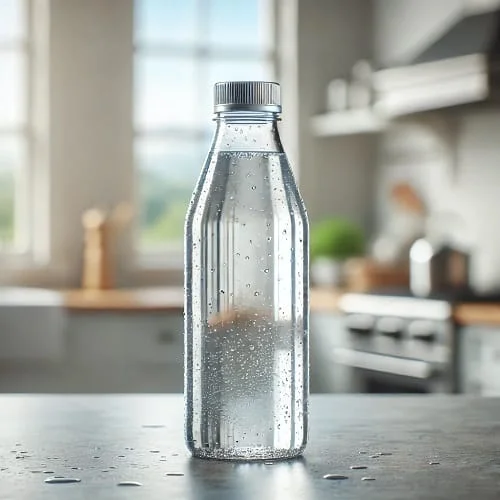
Distilled water is a type of purified water that has been stripped of impurities through a process known as distillation. During distillation, water is boiled to create steam, which is then condensed back into liquid form, leaving behind contaminants like minerals, salts, and other impurities. This process ensures that the water is as pure as possible, making it ideal for various specialized applications.
In households, distilled water is commonly used for appliances such as steam irons, humidifiers, and CPAP machines to prevent mineral buildup and damage. It’s also favored in aquariums and for watering certain plants that are sensitive to minerals in tap water. In laboratories and medical fields, distilled water is critical for experiments and procedures that require the highest level of purity.
The main benefit of distilled water is its lack of minerals and impurities. Unlike tap water, which contains minerals such as calcium and magnesium, distilled water is free from these substances, making it a preferred choice for people who want to avoid contaminants in their water. It’s also ideal for maintaining appliances that can get damaged by mineral buildup, providing longevity and efficiency.
3. Does Distilled Water Expire? The Answer Explained
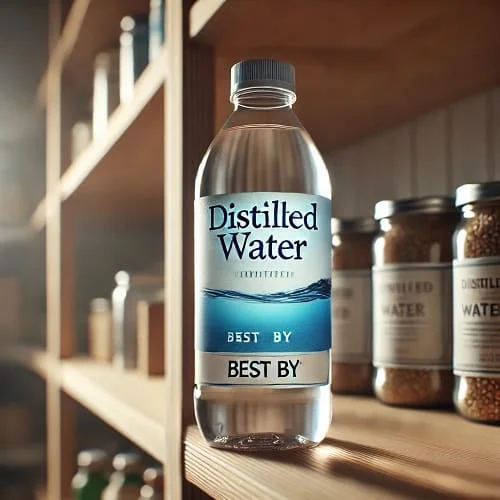
The short answer is no—distilled water itself doesn’t technically expire. Since distilled water is free from minerals, bacteria, and other contaminants, it does not deteriorate or spoil in the same way that other beverages or liquids might. This purity means that, under proper storage conditions, distilled water can last indefinitely without becoming harmful to consume.
However, the quality of distilled water can be affected by external factors. Although it starts as pure, uncontaminated water, the storage container or the environment in which it’s kept can lead to contamination over time. For instance, if the bottle is opened or improperly sealed, dust, bacteria, or mold could find their way into the water, compromising its quality. The same applies if the water is stored in an area that is too warm, humid, or exposed to sunlight—these factors can encourage bacterial growth or alter the water’s clarity.
A common misconception is that distilled water expires because it’s often sold with a “best by” or expiration date on the bottle. This date isn’t necessarily an indication of the water itself going bad, but rather a recommendation for how long the bottle should be used for optimal quality. These dates are primarily for the packaging’s integrity—over time, the plastic may degrade, or bacteria may enter once the bottle is opened.
In conclusion, distilled water does not expire in the traditional sense. However, improper storage can impact its purity, so it’s important to keep it sealed in a cool, dry place for the best results.
4. Factors That Affect the Quality of Distilled Water
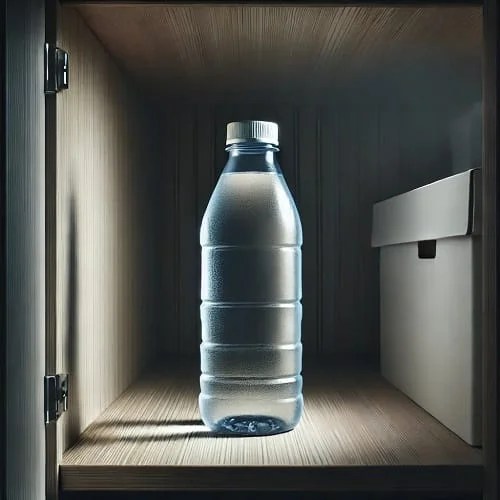
While distilled water itself is free of impurities, several factors can affect its quality over time. Proper storage is crucial to maintaining its purity and ensuring it remains safe for use.
Storage Conditions: Light, temperature, and humidity can all impact the quality of distilled water. Exposure to direct sunlight or high temperatures can promote the growth of microorganisms, even in water that started as pure. Additionally, high humidity levels can cause condensation inside the bottle, which can introduce unwanted contaminants. It’s best to store distilled water in a cool, dry place away from direct light to prevent any changes to its composition.
Container Integrity: The integrity of the container in which distilled water is stored plays a significant role in preserving its quality. Keeping the water in a sealed, airtight container is essential to prevent contaminants from entering. Once the seal is broken, the water becomes more susceptible to dust, bacteria, or mold. Even slight cracks or leaks in the container can allow contaminants to seep in, which could compromise the purity of the water.
Contamination: Improper handling or exposure to unclean environments can lead to contamination. For example, if the water is poured into unclean vessels or touched with dirty hands, it can introduce bacteria, dust, or oils that affect its quality. Even though distilled water is initially free of contaminants, the handling process must be hygienic to prevent any unwanted substances from entering.
Bacteria and Mold Growth: If distilled water is stored improperly—such as in a warm, humid environment or in a container that’s been opened—bacteria or mold may begin to grow. Although distilled water lacks the minerals that typically feed bacteria, mold can still develop if there’s any organic matter or dirt in the container. To prevent this, it’s crucial to store distilled water in a sealed container and avoid exposing it to unhygienic conditions.
By paying attention to these factors, you can ensure that your distilled water remains pure and safe for as long as possible.
5. How Long Can Distilled Water Be Stored?
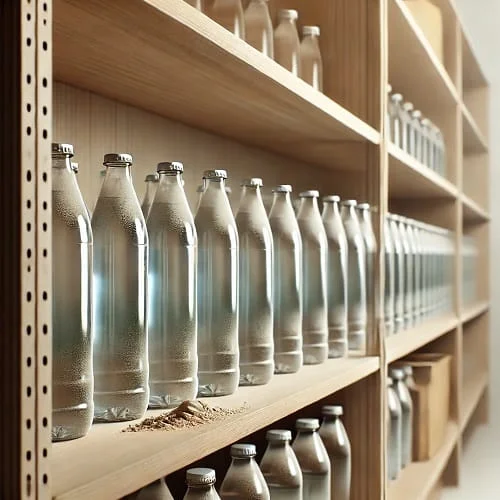
Distilled water can last for an extended period—months to even years—if stored properly. Its lack of minerals and contaminants makes it less prone to spoilage compared to other liquids. As long as it is kept in a sealed container and stored in optimal conditions, distilled water will maintain its purity for a long time.
Best Storage Practices: To ensure the water stays fresh, it’s essential to store it in airtight, sealed containers. Glass or BPA-free plastic bottles work well, but they should always be tightly closed to prevent exposure to air or contaminants. The water should be kept in a cool, dry place away from direct sunlight. High temperatures, humidity, or light exposure can degrade the water’s quality and encourage bacterial or mold growth. Storing it in a pantry or cupboard is usually ideal.
Indicators of Deterioration: While distilled water doesn’t expire in the traditional sense, there are a few signs that it may have been compromised. If the water develops an unusual odor, cloudiness, or visible particles, it’s a good indication that contaminants have entered, and it should be discarded. These changes typically occur if the container has been opened or improperly sealed, allowing bacteria or mold to grow inside.
By following proper storage guidelines, you can extend the shelf life of your distilled water and ensure it remains safe to use whenever you need it.
RELATED POSTS
Lemon Cucumber Water: Boost Your Health
Why drinking water makes you nauseous: Causes and Proven Solutions
Does Coconut Water Go Bad? The Ultimate Guide to Freshness and Storage
What Is Florida Water? From Ancient Traditions to Life-Changing Modern Applications
6. Can Distilled Water Go Bad if Left Open?
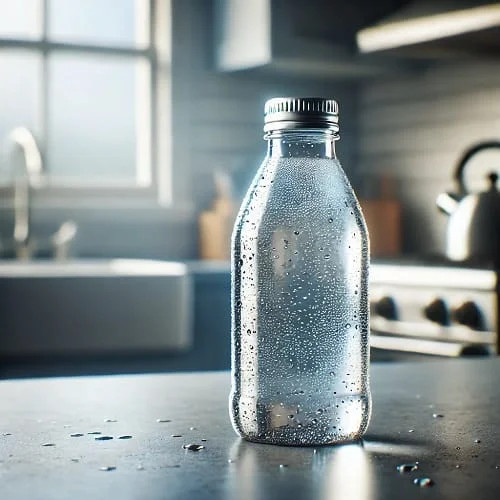
Yes, distilled water can deteriorate if left exposed to air for too long. While distilled water itself is free of minerals, bacteria, and contaminants, exposure to the outside environment introduces the potential for contamination. Once the bottle is opened, air, dust, and even bacteria can enter, compromising the purity of the water. The longer the bottle remains open, the greater the risk of contaminants affecting its quality.
When exposed to air, distilled water can absorb particles and microorganisms from the surrounding environment. This may not cause immediate changes, but over time, bacteria or mold could start to grow, especially if the water is stored in warm or humid conditions. Even small amounts of contamination can alter the water’s clarity and odor, making it unsuitable for use.
How Long Does It Last Once Opened?
It’s recommended to use distilled water within a few weeks after opening the bottle. While the water itself does not spoil immediately, it’s best to consume or use it relatively quickly to minimize the risk of contamination. If the water is left open for an extended period, it’s more susceptible to microbial growth and other forms of deterioration. Always ensure the bottle is resealed tightly when not in use, and store it in a cool, dry place to prolong its freshness.
By keeping distilled water sealed and stored properly, you can ensure it remains safe and high-quality for as long as possible.
7. Is Distilled Water Safe to Drink After Long-Term Storage?
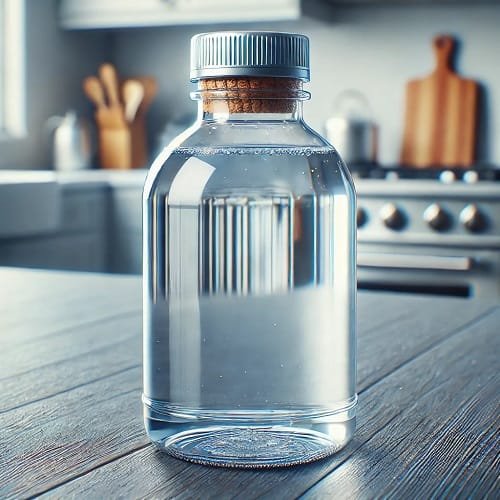
Yes, distilled water is generally safe to drink even after long-term storage, as long as it has been properly sealed and stored in ideal conditions. Distilled water is purified through the distillation process, which removes nearly all contaminants, including bacteria, viruses, and minerals. If the bottle has remained sealed and the water has been stored in a cool, dry place, it will still be free of harmful substances, making it safe for consumption.
Why It’s Safe
Since distilled water is devoid of minerals and impurities, it doesn’t provide a breeding ground for bacteria or viruses unless exposed to the environment. If the water is kept in a sealed, airtight container and hasn’t been opened, it should retain its purity for an extended period. Even after being stored for months or years, as long as there are no signs of contamination like an off smell or cloudiness, distilled water remains safe to drink.
Use in Appliances
Distilled water is also safe for use in appliances like humidifiers, steam irons, and CPAP machines, even after long-term storage. The absence of minerals prevents the buildup of scale or mineral deposits in these devices, extending their lifespan and functionality. So, whether you’re drinking it or using it in your appliances, distilled water remains effective and safe as long as it’s properly stored. Just make sure the container stays sealed to maintain its purity.
8. Frequently Asked Questions (FAQs)
Does distilled water lose its purity over time?
No, distilled water itself does not lose its purity over time. However, if exposed to air, contaminants, or improper storage, its quality can be compromised.
How can you tell if distilled water has gone bad?
Signs that distilled water has gone bad include an unusual odor, cloudiness, or visible particles. If any of these occur, it’s best to discard the water.
Can distilled water be reused after opening?
Yes, distilled water can be reused after opening, but it should be consumed or used within a few weeks. Always ensure the container is tightly sealed and stored in optimal conditions.
What is the best way to store distilled water long-term?
To store distilled water long-term, keep it in a sealed, airtight container in a cool, dry place away from direct sunlight and heat sources.
Can I drink distilled water after the bottle is opened?
Yes, distilled water is safe to drink after the bottle is opened, as long as it has been stored properly. Make sure to use it within a reasonable time frame and check for signs of contamination.
Can distilled water go bad if left in a hot environment?
Yes, heat and humidity can accelerate the growth of bacteria or mold in an opened bottle of distilled water. Always store it in a cool place to maintain its quality.
How long can distilled water be stored unopened?
Unopened distilled water can be stored for years without it going bad, as long as it’s kept in a sealed container and stored properly.
Can distilled water be stored in plastic bottles?
Yes, distilled water can be stored in plastic bottles, but it’s important to use BPA-free plastic and to keep the bottle sealed and away from direct sunlight to prevent any degradation over time.
Does distilled water lose its taste over time?
Distilled water has no taste due to the removal of minerals. However, if exposed to contamination or stored improperly, it may develop an off taste or odor.
Can distilled water be used in cooking?
Yes, distilled water can be used in cooking, particularly in recipes that require the purity of water without minerals that might alter the taste.
Is distilled water safe for plants?
Distilled water is safe for most plants, particularly those sensitive to the minerals found in tap water. However, it lacks essential minerals, so it might not be ideal for all plant types long-term.
Can distilled water be used in baby formula?
Yes, distilled water can be used in baby formula, as it’s free from contaminants. However, always follow the specific instructions provided by the formula manufacturer.
What happens if distilled water is left open for too long?
If left open for too long, distilled water may absorb bacteria or contaminants from the environment, leading to potential mold or bacteria growth, making it unsafe for consumption.
Does distilled water help with kidney stones?
Distilled water can be beneficial for people with kidney stones because it lacks minerals like calcium that could contribute to the formation of kidney stones.
Can distilled water cause mineral deficiency if consumed long-term?
Distilled water does not contain minerals that are typically found in drinking water. Relying solely on distilled water for hydration long-term could contribute to mineral imbalances, so it’s important to have a balanced diet.
Can you mix distilled water with other liquids?
Yes, you can mix distilled water with other liquids, but it’s important to note that its purity may dilute the taste of drinks, so it’s best used for applications where water purity is essential.
9. Conclusion
In conclusion, does distilled water expire? it doesn’t technically expire, but its quality can be affected by how it’s stored. As long as it’s kept in a sealed, airtight container and stored in a cool, dry place away from light and humidity, distilled water can last indefinitely without becoming unsafe to drink or use. However, once exposed to air or improper storage conditions, its purity can deteriorate, leading to potential contamination or the growth of mold and bacteria.
To ensure your distilled water remains fresh and safe for use, it’s important to follow proper storage practices. Always check for signs of contamination, such as unusual odor or cloudiness, before using the water. By keeping your distilled water properly sealed and stored, you’ll avoid unnecessary waste and enjoy its benefits for an extended period.
Remember, when in doubt, follow best practices for storing and handling distilled water to maintain its quality and ensure it remains a safe and reliable resource for all your needs. Stay mindful of proper storage conditions, and you’ll always have fresh, pure water when you need it.
References
- Olympian Water Testing. Understanding the Shelf Life of Distilled Water. Retrieved from https://olympianwatertesting.com/understanding-the-shelf-life-of-distilled-water
- Rocky Mountain Water Distillers. Does Distilled Water Go Bad? How Long Does Distilled Water Last?. Retrieved from https://rockymountainwaterdistillers.com/pages/does-distilled-water-go-bad-how-long-does-distilled-water-last
- The Distilled Water Company. How Long Does Distilled Water Last? Shelf Life & Storage Uncovered. Retrieved from https://www.thedistilledwatercompany.com/shelf-life-storage-distilled-water
- Olympian Water Testing. Are You Still Wondering Does Distilled Water Go Bad?. Retrieved from https://olympianwatertesting.com/are-you-still-wondering-does-distilled-water-go-bad
- Lawrence, Kansas Utilities. Home Facts General 1. How Long Can I Store Drinking Water?. Retrieved from https://assets.lawrenceks.org/utilities/files/Home_Facts.pdf
- WebMD. Distilled Water Overview. Retrieved from https://www.webmd.com/diet/distilled-water-overview
- Aquapap. Does Distilled Water Go Bad?. Retrieved from https://aquapap.com/does-distilled-water-go-bad
- Reddit. Can Distilled Water Actually Expire?. Retrieved from https://www.reddit.com/r/labrats/comments/b3kcpd/can_distilled_water_actually_expire
- Reddit. How Long Does Distilled Water Last For?. Retrieved from https://www.reddit.com/r/water/comments/dg8pg5/how_long_does_distilled_water_last_for

